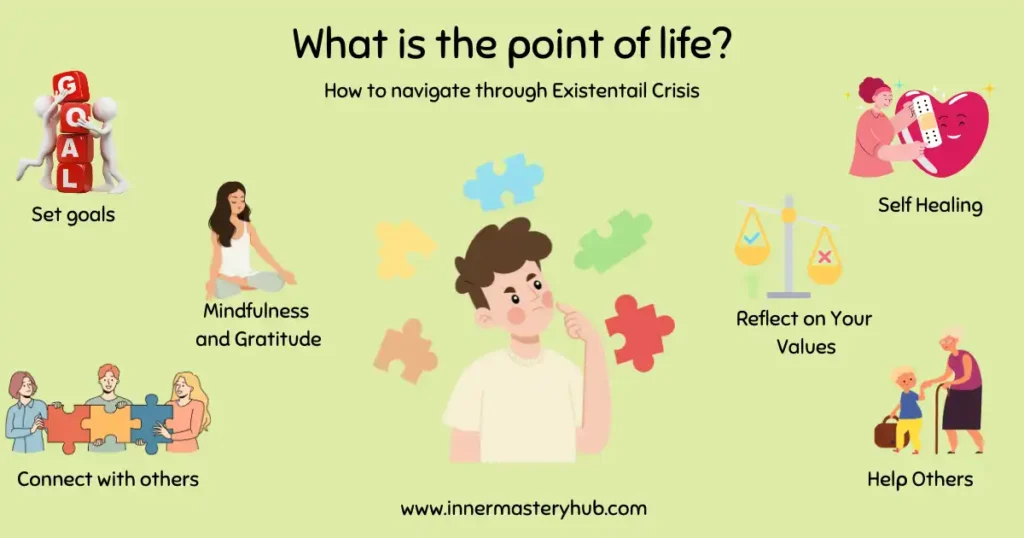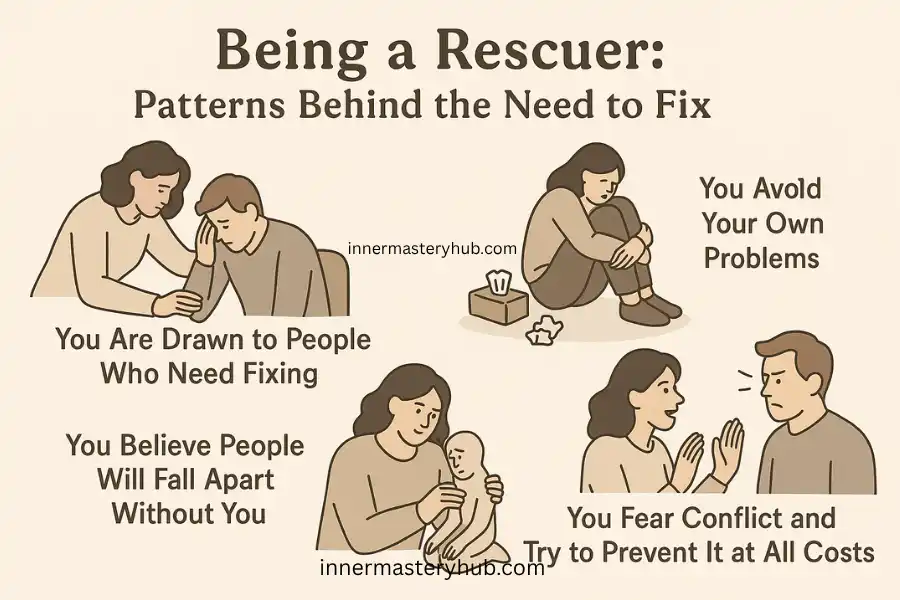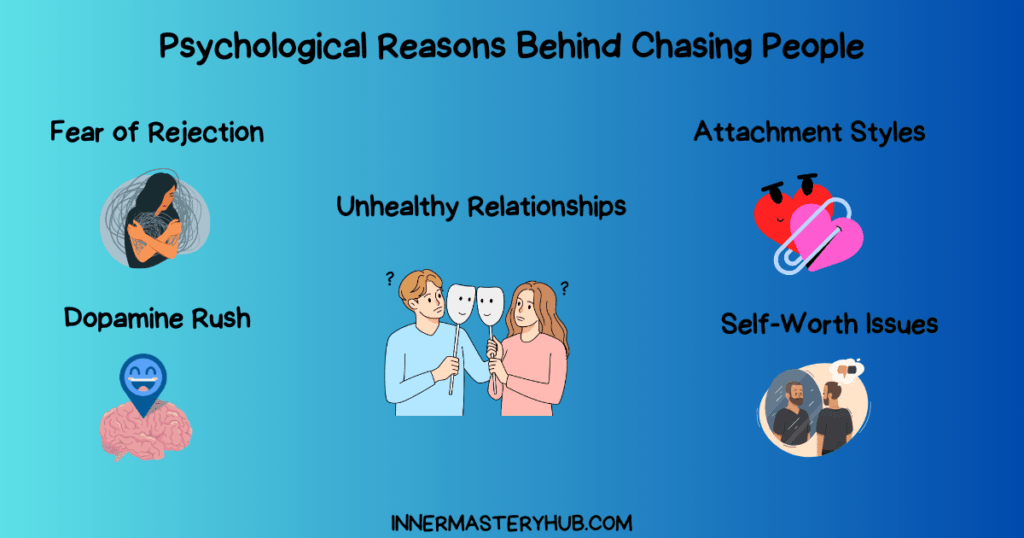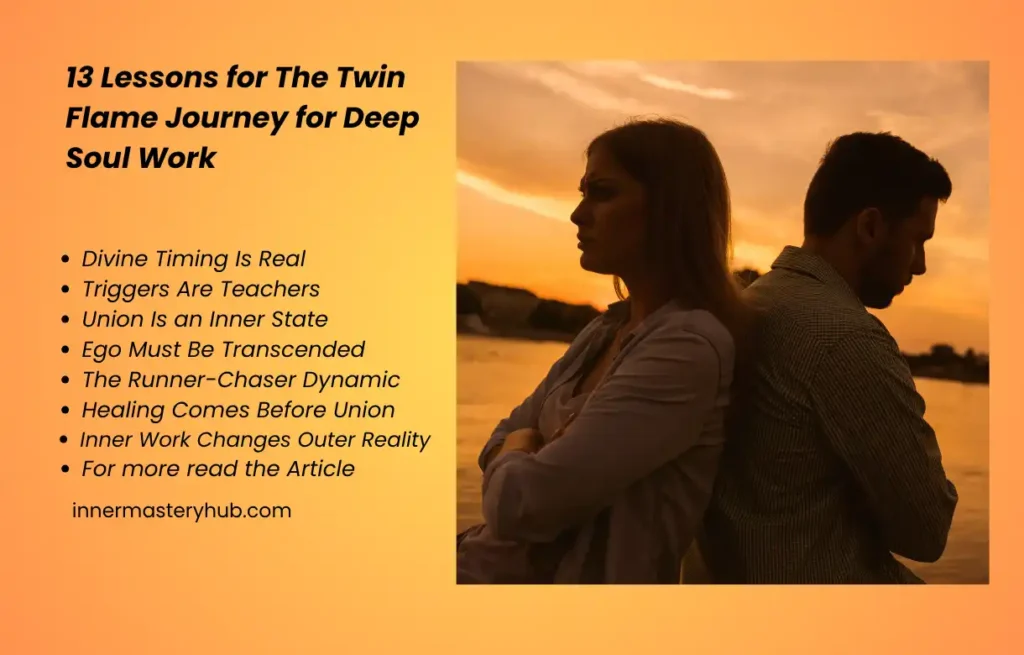What is the point of Life? 9 Solutions to Existential Crisis
What is the point of Life?
The point of life is not one fixed answer. It grows through meaning, connection, and growth. Solutions to existential crisis include self-reflection, helping others, setting small goals, and accepting uncertainty. Purpose often appears when you live with curiosity, kindness, and conscious choice each day.

Haven’t you been feeling lost lately? As though there is a void in your life. You go through this monotonous practice every morning, yet in your heart, you question why everything exists. What is the point of life?
Finding a purpose or meaning when juggling work and responsibilities? It is a question that has been bothering you intermittently for weeks. Here’s the point, though: psychology says that external factors can cause an existential crisis.
Your internal and external realities can significantly influence one another. Additionally, if you’re feeling down or unfulfilled, something in your outside world is likely missing.
Perhaps your network of support is weak. No family or friends who can really relate to you and support you when times are hard. Or it’s possible your education didn’t provide enough direction or guidance on how to find your true happiness.
Let’s not overlook work either. It is evident that, since the majority of us work for a living, our jobs have a significant impact on our overall level of contentment and pleasure. What if, however, your work leaves you feeling depleted and empty? What if it doesn’t motivate or challenge you?
If you can relate to any of these situations, it might be time to take a moment to think. Step back and consider what part of your external environment is producing this imbalance in your inner world.
All of your depression will go away after you’ve found the source of your meaninglessness. The tricky part then begins: implementing adjustments to improve your circumstances. It won’t be simple, and you might even need to step out of your comfort zone or take some risks.
But believe me, the effort will be worthwhile if you can find a significant purpose and meaning.
Continue looking for the final ingredient; clarity, meaning, and purpose will emerge once everything is in its proper place.
Signs You Question: What is the point of Life?
The following symptoms could be a sign that you’re having trouble finding purpose in life:
-Daily chores feel pointless, and you wonder why you put up with them; it’s a repetitive loop with no motivation or sense of achievement.
-Your life seems meaningless and unfocused, and you are constantly questioning yourself, “What is the point of life?”
You are no longer excited by anything. Things you used to enjoy now seem like burdens. Even happy or prosperous times are clouded by the persistent sense that something else must be going on.
As you wonder why you are here, existential thoughts are racing through your head.
There is yet more to the story! The next stage is to accept these emotions and seek help, whether from a friend or a therapist,
Why Does Life Feel Pointless Sometimes?
Here are some reasons why this feeling might creep in:
-You may be having trouble defining your goals because you are unsure about what you want.
-Grief, loss, trauma, breakup, or significant life changes can leave you feeling adrift, questioning the meaning you once held.
-Social media and societal pressures, constantly comparing ourselves, can make our own lives feel insignificant.
-Feeling unfulfilled in work or relationships can leave a void of meaning.
Feeling this way doesn’t mean something is wrong with you. It’s a signal that something in your life needs attention and adjustment. Reflect on your daily life, your relationships, and your goals. Small changes can often make a big difference in rekindling a sense of purpose.
How to answer the question, What is the point of Life?
What gives one individual purpose may not resonate with another. Some depend on family and friends for affection, support, and a sense of belonging.
Some find purpose in jobs, hobbies, or creativity. Spirituality or religion can help some people understand Life and provide direction and purpose.
Knowing what matters most to you is essential. Every person has different values. Therefore, there’s no correct answer to what makes Life meaningful. What makes one person happy may not make another happy, and that’s okay.
If you’re lost or confused about Life, consider what you value most. Consider your values, hobbies, and happiness. Exploring these areas may help you find direction and purpose. Below are some suggestions:

1-The Life Audit
Analyze your life by looking at your values—or lack thereof. Do your regular activities align with your actual values? Are your career decisions consistent with your fundamental beliefs? Finding your basic principles again and recognizing any inconsistencies can serve as a strong wake-up call.
2-Connect with others
A feeling of purpose and belonging can be gained by establishing deep connections with friends, family, and even strangers. You may add dimension to your life and make enduring memories by connecting with people and exchanging experiences.
3-Set goals and work towards them
Having goals gives structure to our lives and helps us stay motivated. By setting clear objectives for yourself – whether they are personal or professional –you are giving yourself something to find purpose in Life.
4-ExplSpiritualitylity
Beliefs and spirituality provide a path to purpose for some people. Spirituality, whether through formal religion, individual meditation, or a sense of oneness with a greater power, can offer solace and meaning.
5-Help Others
One might find contentment and a feeling of purpose by volunteering and assisting people in need. Being able to influence someone else’s life positively can be immensely fulfilling.
6-Seek New Experiences
Try something new and go outside of your comfort zone. Experience new cultures, travel, or pick up a new skill. Your perspective can expand, and you can learn more about what matters to you through new experiences.
7-Reflect on Your Values
Consider for a moment what is most important to you. Which values do you uphold? You may steer toward pursuits and objectives that align with who you are by becoming aware of your core principles.
8-Mindfulness and Gratitude
Appreciating what you have and living in the present will help you feel more fulfilled. You can connect with your inner self through mindfulness practices such as journaling or meditation.
9-Healing Your Inner Self
Trauma can leave you lost, questioning Life’s purpose. It’s like staring through a storm, unable to see the beauty beyond. Healing is the first step. Therapy and self-care, like journaling and meditation, can help process emotions and rebuild resilience.
As you heal, you reconnect with your values and what truly matters. This newfound clarity helps you find meaning that aligns with your authentic self. Remember, healing is a journey, but with each step forward, the potential for a meaningful life filled with purpose gets brighter.
Keep in mind that discovering life’s purpose is an ongoing journey. It’s acceptable to go off track and consider alternative viewpoints as you develop and mature. Staying loyal to who you are and what you find rewarding is what matters most. Enjoy the process of achieving self-worth and well-being.
FAQS about “What is the point of life”?
How do you have a meaningful life?
A journey of connection rather than a lofty goal is what makes a life valuable. It’s about enjoying the moment, helping others, and following passions. Find the things that make you happy and follow them.
How do you have a meaningful life?
Connection creates meaning. Go after your passions, help others, and enjoy the moment. To live a happy life, discover your flame and let it illuminate the path.
What is the point of life?
There is no universal answer. Many believe the point of life is to find or create meaning by loving others, growing, contributing, and seeking truth. Others say it’s simply to live, enjoy, and make the world better in whatever way you can.
How do I find meaning in life?
Meaning emerges through connection, purpose, challenge, and impact. Set goals that align with your values, help others, grow your talents, and engage in what you care about. Over time, these efforts shape what life means to you.
Does life have an objective purpose?
Many philosophies and religions propose objective purposes—serving God, attaining enlightenment, or fulfilling duties. But secular views often say life’s purpose is subjective: what you define for yourself. There is no scientific proof of a universal purpose.
What do religions say is the point of life?
Religions often teach life’s purpose is to serve or know the divine, obey moral laws, and prepare for an afterlife or spiritual union. For example, Islam says life is a test, and worshiping God is central.
What is the meaning of life in philosophy?
Philosophers debate many views: existentialists say life is what you make of it; utilitarians focus on maximizing happiness; some say meaning comes from virtue, relationships, or knowledge. The question remains open and personal.
Is life meaningless — a nihilist view?
Yes, some believe life has no inherent meaning (nihilism). But that view can be freeing: if nothing is predetermined, you are free to create your own meaning, values, and purpose.
How do I live a meaningful life now?
Start small: be kind, pursue what you love, help others, build relationships, and learn and grow. Make choices aligned with what matters to you. Even small actions accumulate into a life that feels meaningful.
Can the point of life change over time?
Absolutely. What feels meaningful at age 20 may differ at 40 or 70. As you grow, your values, priorities, and responsibilities shift. The point of life can evolve with you.
What is the meaning of life in philosophy?
Philosophers debate many views: existentialists say life is what you make of it; utilitarians focus on maximizing happiness; some say meaning comes from virtue, relationships, or knowledge. The question remains open and personal.
What do religions say is the purpose of life?
Religions often teach life’s purpose is to serve or know the divine, obey moral laws, and prepare for an afterlife or spiritual union. For example, Islam says life is a test, and worshiping God is central.
Does life have an objective purpose?
Many philosophies and religions propose objective purposes—serving God, attaining enlightenment, or fulfilling duties. But secular views often say life’s purpose is subjective: what you define for yourself. There is no scientific proof of a universal purpose.






